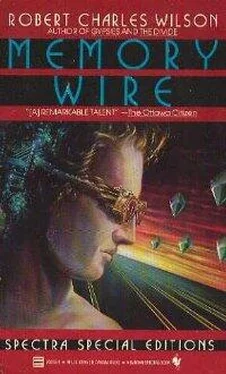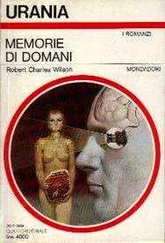Robert Wilson - Memory Wire
Здесь есть возможность читать онлайн «Robert Wilson - Memory Wire» весь текст электронной книги совершенно бесплатно (целиком полную версию без сокращений). В некоторых случаях можно слушать аудио, скачать через торрент в формате fb2 и присутствует краткое содержание. Год выпуска: 1987, ISBN: 1987, Издательство: Bantam Spectra, Жанр: Фантастика и фэнтези, на английском языке. Описание произведения, (предисловие) а так же отзывы посетителей доступны на портале библиотеки ЛибКат.
- Название:Memory Wire
- Автор:
- Издательство:Bantam Spectra
- Жанр:
- Год:1987
- ISBN:978-0-553-26853-9
- Рейтинг книги:4 / 5. Голосов: 1
-
Избранное:Добавить в избранное
- Отзывы:
-
Ваша оценка:
- 80
- 1
- 2
- 3
- 4
- 5
Memory Wire: краткое содержание, описание и аннотация
Предлагаем к чтению аннотацию, описание, краткое содержание или предисловие (зависит от того, что написал сам автор книги «Memory Wire»). Если вы не нашли необходимую информацию о книге — напишите в комментариях, мы постараемся отыскать её.
Memory Wire — читать онлайн бесплатно полную книгу (весь текст) целиком
Ниже представлен текст книги, разбитый по страницам. Система сохранения места последней прочитанной страницы, позволяет с удобством читать онлайн бесплатно книгу «Memory Wire», без необходимости каждый раз заново искать на чём Вы остановились. Поставьте закладку, и сможете в любой момент перейти на страницу, на которой закончили чтение.
Интервал:
Закладка:
Keller had fallen into a standing doze when a van pulled up at the verge of the road, waking him. The sky was faintly brighter now, and he was able to read the word Eletronortein faint white letters along the rust-scabbed body of the van. The driver waited, his engine idling.
Keller showed himself first, then Byron, and then Teresa. The driver, an Indio with large unblinking eyes, waved them into the back. Keller latched the door behind him and the van jolted forward.
They sat on the empty metal floor with their backs against the bulkhead. Teresa said wearily, “Where’s he taking us?”
Byron shrugged. “It doesn’t matter. We can’t go back through Rio. We should stay away from the big cities altogether.”
Teresa held the wrapped oneirolith in her hands, steepled delicately between her fingers. “At least,” she said, “we got what we came for.”
“You did,” Byron said. “And I guess Ray did. Pretty good footage, right, Ray? Damn nice footage.”
Keller said nothing. Teresa was leaning against him now, her eyes closing. Keller put his arm out to steady her, and the truck carried them down the night roads, away from Pau Seco.
He drifted on the edge of sleep for a time, conscious of her warmth and of the weight of her against him as the Eletronortevan rattled into the dawn. The driver glanced back occasionally but did not speak, the expression on his face faintly puzzled, as if he were trying to make sense of this new and mysterious cargo. At last, when the light filtering back from the cab woke him, Keller managed a smile. “Thank you for the ride,” he said hoarsely.
The driver shook his head. “ Ela e muito gentil.” He gestured at Teresa. “Pretty girl.”
Very pretty, Keller thought innocently.
“Your girl? Your wife?”
“No.” Not quite that. But he closed his arm around her protectively, and she moved against him in her sleep.
“Your girl,” the driver said toothily, and turned his attention back to the road.
And Keller recognized—a moment of insight as penetrating as the sunlight—that it was true, he was falling in love with her… maybe had already fallen in love with her.
It put him in a bad position.
Adhyasa, Keller thought. He was supposed to be a machine, and machines are supposed to be indifferent: you can’t suborn a machine. A machine in love might be tempted to look away.
And yet… He sat in the back of the jolting truck with her body pressed against him and wanted her more than he had wanted anything for years. The wanting itself was a new thing, and it ran through him like a tide. A part of him welcomed it: this thawing of ancient tundra. But he knew the risks. Stray too far from the Ice Palace and he would be stripped, vulnerable. Outside the Palace, all manner of things waited.
Old pain. Memories. Things seen.
And yet…
“Here,” the driver said suddenly. The truck slowed. Keller bounced back against the metalwork; Teresa moaned and stirred. “ Avie-se! Please hurry now.”
And then they were alone again, blinking at the sunlight in a dry junction town called Sinop.
They had bank certificates and cruzeiro notes; enough, Byron said, to get them out of the country. They should find a room and in the morning strike out along the eastern highway to Barreira or maybe Campo Alegre. He knew people in Belem ; from Belem he could arrange a flight out of the country.
They found a cheap room by nightfall. Byron went out with a fistful of coins: he wanted to make some calls, he said, “but not from here.” And maybe get drunk. He looked at Keller, at Teresa. Maybe definitely get drunk.
The door sighed closed after him.
Teresa pulled the drapes and switched off the lights. The room was dark as a cavern now, the roar of traffic from the main street loud in the darkness. She climbed onto the cheap sprung mattress where Keller was lying and curled against him. She was wearing the clothes she had worn from Pau Seco, and he could smell the oil from the truck and the pungency of her sweat. After a moment he realized she was shaking.
“Scared?” he said.
She rolled over and nodded into his chest. “We’re in over our heads, aren’t we? That’s what all this means. We’re in way over our heads.”
It was true, of course. Wexler had promised her an easy trip—“a vacation.” But the huge military presence at Pau Seco and the palpable fear in the eyes of Meirelles demonstrated that the project had gone a long way beyond that. Someone had taken an interest in them. The federal agencies, Keller guessed. Wexler must have been harboring an informant at his estate in Carmel. Or Wexler was the informant, or had confessed under interrogation. It didn’t matter which. What mattered was that someone had taken an interest in them—someone powerful.
Because he could not think of anything reassuring to say, he soothed her with his hands.
“You’re an Angel,” she said sleepily.
He nodded in the dark.
“Everything goes into memory?”
“What I see. What I hear.”
“Even this?”
He admitted, “Even this.”
“Who sees it?”
“Maybe nobody.”
“Who turns it into video?”
“I do,” Keller said. “I do my own downloading at the Network shops.”
“Would you download this?”
This conversation, he thought she meant; or more broadly, what had begun to happen between them. He hesitated. “No,” he said finally.
She traced the contour of his skull with her fingers. “You have wires in there.”
He nodded.
“They say it affects you.”
“It can.”
“Does it?”
“Sometimes. Sometimes it’s hard to tell. Memory plays tricks.” He looked into the darkness. “Just before they installed the harness, back in the military hospital at Santarem, I lifted a text out of the medical library. There was a list of side effects, what could happen if things went wrong. Blindness, amnesia, disturbance of affect—”
“Affect?”
“Emotional affect.” He smiled, although of course in the darkness she could not see. “Love, hate.”
“You have that?”
“I don’t know.” The question made him uncomfortable. “Sometimes I wonder.”
There was no way to tell her what this really meant. No way to condense the experience. He had emerged from the military hospital into a world of complex uncertainties. It was not the brain the wires had invaded; it was the essence, the self. Every perception became suspect, every emotion a potential symptom. So you learn,, Keller thought: you practise wu-nien very carefully… you become, in some fundamental way, a machine.
It was, he wanted to say, a strange combination of clarity and confusion. Like those nights when the fog comes in so thick you might as well be blind, but sound carries with great intimacy over startling distances. You can’t see your feet, but a buoy clanging out in the bay comes to you with that high, sad tonality all intact. He was able to register the distant bell-ringing of events, commerce, politics. He was good at it. But the fog concealed love. The fog concealed hate.
“It must be strange.” She was calmer now, drifting into sleep, nuzzled against him.
“It is.” But he was not certain she heard him. Her breathing grew deeper until she was limp in his arms. “It is.” He addressed the dark and silent room. “It is.”
They bused into the northern province of Para and stayed a night in Campo Alegre, on the Araguaia River. It was an old cattle town surrounded by corporate ranches; the accommodations were crude, the smell of the slaughterhouse reminded Keller unpleasantly of Cuiaba. They checked into a twentieth-century hotel occupied by the morose agents of foreign meat wholesalers, and surprised the clerk by paying cash. Cash was bad, Byron said, cash was conspicuous; but until they could arrange some black-market credit, cash was also a necessity.
Читать дальшеИнтервал:
Закладка:
Похожие книги на «Memory Wire»
Представляем Вашему вниманию похожие книги на «Memory Wire» списком для выбора. Мы отобрали схожую по названию и смыслу литературу в надежде предоставить читателям больше вариантов отыскать новые, интересные, ещё непрочитанные произведения.
Обсуждение, отзывы о книге «Memory Wire» и просто собственные мнения читателей. Оставьте ваши комментарии, напишите, что Вы думаете о произведении, его смысле или главных героях. Укажите что конкретно понравилось, а что нет, и почему Вы так считаете.












